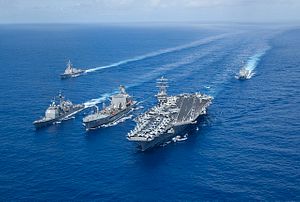Recently, I had lunch with a keen analyst of Asian affairs who feared for American credibility in Northeast Asia. I argued it was likely, though not certain, that a PLA attack on Taiwan would push the U.S. to respond with force. In the case of Japan, it’s nearly impossible to think a Chinese assault, even one limited to remote islands, would not lead to a Sino-American war if Japan required U.S. assistance (Jun Okumura and Paul Sraric debated the contention in The Diplomat recently).
To quote the Thucydidian “trinity,” three factors underpin U.S. engagement in Northeast Asia: self-interest, honor and fear. Regarding self-interest, Northeast Asia, along with Europe and North America, is one of the centers of wealth and power on this planet. The U.S. wants them to be open to U.S. political and economic influence.
The 21st century counterpart of Hellenic honor is the mindset that defines U.S. policymaking since at least 1941: America must be preeminent. Venezuela aligning with Cuba and China is not incompatible with American honor, but losing Japan is. Additionally, democratic ideology and Christianity are potent forces in America, potentially adding a quasi-religious dimension to the survival of freedom against the godless communist tyrants of Beijing.
Finally, there is the fear that Chinese hegemony in the region would endanger “core” American interests and the U.S. itself. Chinese inroads in Latin America, the Middle East, Africa, and other continents add to this feeling that the PRC is a danger to America.
Concerns about U.S. credibility are unavoidable. Those who depend on others always harbor doubts about their protectors. Recent events are fueling this round of anxiety: the invasion of Ukraine, the so-far feckless Operation Inherent Resolve (the Orwellian moniker for campaign against the Islamic State), and cuts in U.S. defense spending.
Ukraine itself is not as important to the U.S. as Japan (or even Taiwan) is. The Western European NATO states opted for appeasement, while the Ukrainian counterattack revealed that Kiev lacked an army. The U.S. ability to respond was thus hamstrung. This differs from Northeast Asia, where the U.S. allies are functional polities and, unlike Western Europe, face a direct threat.
The Islamic State insurgency (which I have written about previously) encompasses interconnected disputes involving states (Turkey, Iran, Israel), oil-and-gas clans (such as the Saudis and the Thanis of Qatar), former states (Iraq, Syria, Lebanon) and quasi-states (Kurdistan, Islamic State, Hezbollah, Palestine-Fatah, Palestine-Hamas) and the stateless (including Al-Qaeda, the PKK, sects, and tribes) in Mesopotamia and beyond. The Caliphate is fighting foes of the U.S. (Assad), the Iraqi Shia aligned with Iran, and received help from American “allies” who fund Sunni jihadists (Saudis, Qataris, etc.). Emile Simpon’s War From the Ground Up, which considers the limited political efficacy of Western military intervention, applies perfectly to this tragedy. Short of bombing the Caliphate with megatonic warheads or re-introducing conscription to deploy twenty million soldiers and Marines from Tripoli to Tehran, the U.S. will have to rely mostly on indirect methods through regional players with dubious credentials and contradictory goals. The Middle Eastern black hole is vastly different from the challenges of East Asia.
The Pentagon suffered from budget cutting. But is not on a starvation diet (unlike European NATO budgets). Washington has not engaged in unilateral disarmament. The drawdown of U.S. forces in Afghanistan and Iraq released resources for other theaters. One thing, however, is certain: the more Washington devotes its energy to wars in the Middle East for the stake of credibility, the fewer forces will be available for Northeast Asia.
(My friend asked if Chinese immigration in the U.S. would make it harder for Washington to confront Beijing. Except when lobbying for Ireland, Israel, Poland and other countries that have a good image in America, “ethnics,” especially when many are foreign-born or the children of foreigners, as is the case for Chinese-Americans, steer clear of appearing to be agents of influence of enemy nations. Many are also hostile to the Chinese Communist Party. In fact, as the numerous Chinese and Asian-Americans I know who serve in the U.S. government attest, they provide the U.S. military, diplomatic corps, and intelligence community with a familiarity with China and Asia that makes it easier for the U.S. to deal with the region. As for wealthy Chinese with close CCP ties who make America their home and safe deposit box, they would probably be detained by the U.S. as pawns to be traded with interned American nationals in China and, in the case of children of high officials, to put psychological pressure on their parents and relatives).
Nevertheless, a loss of perceived credibility is dangerous. It gives Beijing more incentive to be aggressive. Fence-sitting countries are less likely to back America if they don’t think John Wayne’s cavalry will ride to the rescue.
What can Washington do about it? Options are limited. Current sanctions on Russia may yet work, but without EU backing the U.S. will find it hard to thwart Putin quickly (even if it may do slowly). Throwing more firepower into the war on the Caliphate would not help if it ends in defeat. Spending more on the Pentagon is a better option. Besides the military advantages, it is a form of Keynesian stimulus, but Hooverian austerity has captured Washington (as it has Brussels), so that looks unlikely. Inducing the allies to do a lot more to protect their homelands is a worthy endeavor, but there is little to show for it.
It may well be that U.S. allies and the U.S. itself overestimate the bellicosity and power of the People’s Republic of China. But only the paranoid survive. Thus, devoting energy to closing the credibility gap, even if it is as unreal as John Kennedy’s invented “missile gap,” makes sense.
Robert Dujarric is Director, Institute of Contemporary Asian Studies, Temple University Japan. [email protected]

































